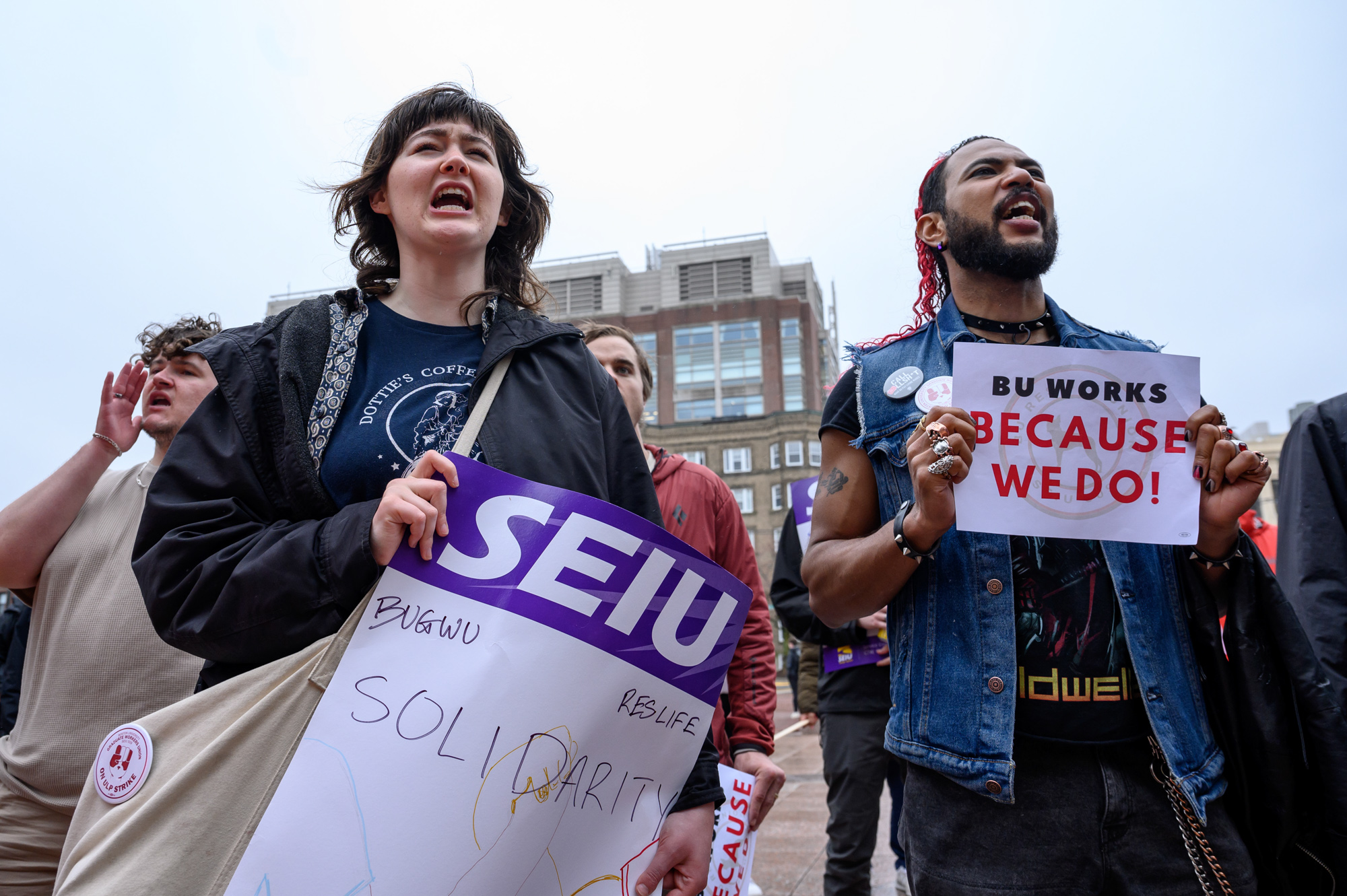The Boston University ResLife Union went on strike for four days from April 12 to 15. The union decided to strike during a “high impact” long weekend, with both admitted student events and the Boston Marathon happening.

The union voted in favor of authorizing the strike on April 11 after unsuccessful negotiations with BU administration.
Adam Shamsi, a graduate resident assistant and a student in the Graduate School of Arts and Sciences said the union put up an ultimatum that BU was unable to meet, influencing their decision to go on strike.
“I felt it’s time to take an escalatory step so that they can hopefully hear us and hear that our demands are reasonable,” Shamsi said.
The union made several proposals to the university including a semesterly wage of $4,500, health care benefits and rights to accommodations to “improve the overall conditions for all BU ResLife workers,” according to their contract proposal summary.
BU’s Dean of Students Office emailed students on April 11 at about 6 p.m., notifying students that the 295 resident assistants, graduate resident assistants and graduate housing assistants of the ResLife Union would go on strike starting April 12.
“Striking is a fundamental right afforded to employees,” Dean of Students Jason Campbell-Foster wrote in the email. “We respect their choice to cease duties as we negotiate their first labor contract since unionizing in 2023. Equally as important as respecting their right to strike is our commitment to ensuring that you continue to have access to support and services in a safe environment.”
Campbell-Foster also wrote that during the strike, RA duties will be handled by “professional residence life staff” over the weekend and overnight. However, the ResLife offices will be closed from 7 to 10 p.m. every night due to lack of coverage and that even though professional staff will be responding to calls to the on-call phone, lockout wait times may be longer if more urgent matters occur.
According to Shamsi, striking ResLife workers hung graphics up in different residence areas that provided alternate ways to seek help in the absence of RAs.
Kira Levenson, a graduate resident assistant and a master’s student in the School of Public Health, said one of the biggest issues the union is fighting for is fair compensation. With the cost of tuition at BU exceeding $66,000, fair compensation is important to the union.
“When tuition is so expensive, we still have to pay that,” Levenson said. “We need that money to have an income so that we’re able to take care of emergencies, take care of our tuition and save for the future.”
The union proposed revised regulations surrounding sick leave. Shamsi said he’s heard of resident assistants missing on-call shifts because they got sick or hospitalized and that these employees faced repercussions from their supervisors.
“If I’m on-call one day and, God forbid, something happens to me, I don’t want to be punished just because I have to go to the hospital,” Shamsi said.
Shamsi said another concern is that ResLife workers aren’t able to provide life-saving care to students in a way they would like to, since RAs are not allowed to physically intervene in the case of a medical crisis. The union is advocating for training in CPR, Narcan and other life-saving care.
“We were explicitly told by members of BU administration that if we were to administer this life-saving care, they cannot promise us whether or not we will have a job after,” Shamsi said.
Choosing to strike during Marathon Monday was the union’s “means to an end to get to that contract where we can all be treated fairly,” Levenson said.
The union decided to go on strike during one of the busiest weekends during the spring semester.
BU holds admitted students weekends and open house programs throughout the month of April. Last weekend, the Mosaic Community Welcome program, a three-day, two-night overnight experience that “explores diversity at BU,” hosted admitted students from April 11 to 13.
Levenson said striking over a week with admitted students events will show parents and prospective students “who’s doing that essential work and what it means to be part of the BU community and support one another.”
“What we want is to show that BU has the power and responsibility to really address this right now and to protect its workers rather than exploit,” Levenson said.
The Boston Marathon ran through Beacon Street in South Campus. During the marathon, the ResLife Union held a picket line in front of Ruggles Church.
Lillian Droscha, a graduate resident assistant master’s student in the School of Public Health, said the union was “strategic” in choosing to strike on Marathon Monday because “it’s a day that lots of people see BU present.”
“It’s kind of a notorious day in ResLife, so it’s a weekend that the university definitely feels the need for our labor,” Droscha said.
Aside from the marathon happening, Marathon Monday is widely known for being a high-risk day where students go to parties and drink heavily.
Shamsi said he remains optimistic about the strike and hopes the university will “negotiate in good faith.”
“I think that we do hold a lot of power, and I think that after this weekend, BU will see and realize that we hold a lot of power,” Shamsi said.
Shamsi said there are no current plans for another strike at this time.
Maya Mitchell contributed to this article.























































































































